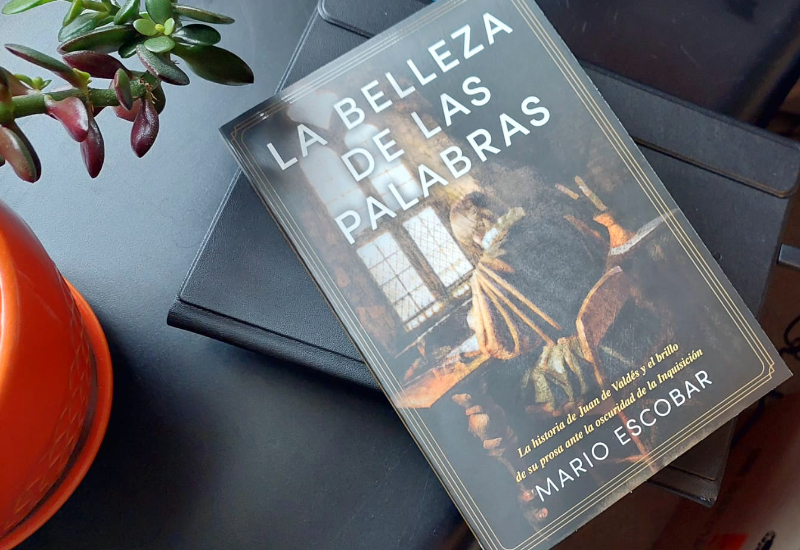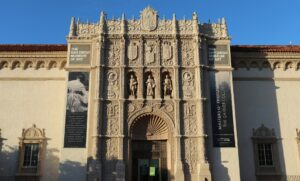Lilia O’Hara
El historiador Mario Escobar cuenta la vida de Juan de Valdés en La belleza de las palabras
La mejor manera de aprender historia es cuando nos la cuentan como un cuento o una novela. ¿No es cierto? El único riesgo es que el historiador se engolosine con la narrativa y agregue demasiadas cosas de su propia cosecha.
En este libro, ese no es el caso.
Acaba de publicarse una obra escrita por el historiador español Mario Escobar, se titula La belleza de las palabras y es una biografía del escritor del siglo 16, Juan de Valdés.
¿Quién quiere leer sobre este personaje? ¿Es alguien famoso?
Bueno, basta un lector curioso para averiguarlo. Lo peor que puede pasar es que después de leer unas cuantas páginas uno deje el libro de lado y decida donarlo a alguna biblioteca o librería de usado.
Pues bueno, este libro resulta bastante fácil de leer y es una manera de conocer la vida del escritor Juan de Valdés. El lector se da una idea de lo que pasaba en el mundo intelectual y religioso de principios del siglo 16, cuando la Santa Inquisición —que existió en España desde 1478 bajo el auspicio de los reyes Católicos hasta 1808, cuando Napoleón Bonaparte finalmente la abolió— decidía perseguir a autores cuyas obras consideraba cuestionables.
El libro se lee a veces como una historia de aventuras; en otros momentos es un libro de historia, pero además, está escrito con un tono que hace pensar en el español antiguo. Esto no se nota en el léxico, todas las palabras son modernas y actuales, sino en el tono, el ritmo y el matiz de la narración.
Para los que no tienen idea de lo que pasaba en las universidades de esos años en España, en las cortes y en la Iglesia misma, este libro presenta un retrato claro y fácil de interpretar de esa época.
El marco de las aventuras de De Valdés en la Reforma Protestante liderada por Martin Lutero y apoyada por el teólogo humanista Erasmo de Rotterdam. Sí, esto trae memorias de las clases de historia, pero la novela solo habla de ellos en los márgenes y en citas acomodadas al principio de los capítulos.
En el libro se cuenta cómo Juan de Valdés escribió un libro enfocado en explicar con un lenguaje sencillo la teología del cristianismo. Quería que la gente que no tenía estudios pudiera entender lo que la Biblia contenía, era un catecismo, pero en ese entonces solo la Iglesia tenía tal autoridad y aunque su obra contradecía lo escrito en la Biblia, de todas maneras fue perseguido.
El español originario de Cuenca y estudiante en Alcalá de Henares, tiene entonces que partir a Roma, y luego a Nápoles, donde pudo finalmente desarrollar una carrera intelectual.
La obra presenta también al hermano de Juan, Alfonso, un miembro de la corte española. Sus cuitas, junto con las de personajes históricos y ficticios ayudan a que la historia avance con fluidez.
La obra en sí es sencilla y uno queda un poco sediento de más detalles, pero la historia alrededor de este personaje no es muy rica. Hay que dejar el resto a la lectura de otras obras sobre esa época. La vida de Lazarillo de Tormes y de sus fortunas y adversidades viene a la mente, y no es casualidad.
El autor de La belleza de las palabras, Mario Escobar, ha escrito numerosos libros sobre la Inquisición, la Reforma Protestante y las sectas religiosas. El autor se ha especializado en la vida de españoles y estadounidenses poco ortodoxos.
El libro está a la venta en diferentes sitios de internet.
Historian Mario Escobar recounts the life of Juan de Valdés in his new book
Lilia O’Hara
The best way to learn history is to learn it through a story or a novel. Isn’t that true? The danger is that the historian gets too caught up in the narrative and adds too much of his own creation.
This is not the case with this book, however.
The Spanish historian Mario Escobar has just published La belleza de las palabras (The Beauty of Words), a biography of the 16th-century writer Juan de Valdés.
Who would want to read a book about this man? Is he famous?
Well, it only takes a curious reader to find out. The worst thing that can happen is that after reading a few pages, you put the book aside and decide to donate it to a library.
This book is quite easy to read and is a way to learn about the life of the writer Juan de Valdés. The reader gets an idea of what was going on in the intellectual and religious world of the early 16th century, when the Holy Inquisition — which existed in Spain from 1478 under the auspices of the Catholic kings until 1808, when Napoleon Bonaparte finally abolished it — decided to persecute authors whose works it considered questionable.
The book reads at times like an adventure story, at other times like a history book, but it is also written in a tone reminiscent of old Spanish. This is not in the vocabulary, all the words are modern, but in the tone, rhythm and nuance of the narrative.
For those who have no idea what was going on in the universities of Spain, in the courts, and in the Church itself during those years, this book presents a clear and easy-to-interpret portrait of the time.
The setting for De Valdes’ adventures is the Protestant Reformation, led by Martin Luther and supported by the humanist theologian Erasmus of Rotterdam. Yes, this brings back memories of history classes, but the novel speaks of them only in the margins and in quotations placed at the beginning of the chapters.
The book tells how Juan de Valdés wrote a book. His goal was to explain the theology of Christianity in simple language. He wanted people who were not educated to understand what the Bible contained; it was a catechism, but at that time only the Church had such authority, and although his work contradicted what was written in the Bible, he was persecuted anyway.
The Spaniard, originally from Cuenca and a student in Alcalá de Henares, then had to go to Rome and then to Naples, where he was finally able to develop an intellectual career.
La belleza de las palabras also introduces Juan’s brother Alfonso, a member of the Spanish court. His troubles, along with those of the historical and fictional characters, help to keep the story moving smoothly.
The book itself is straightforward and leaves you a little thirsty for more details, but the story around this character is not very rich. You will have to leave the rest to the reading of other works about this period. The life of Lazarillo de Tormes and his fortunes and misfortunes come to mind, and this is no coincidence.
The author, Mario Escobar, has written numerous books on the Inquisition, the Protestant Reformation and religious sects. He specializes in the lives of unorthodox Spaniards and Americans.
The book is for sale on various Internet sites.
Help to keep this site alive. Se aceptan donaciones.




